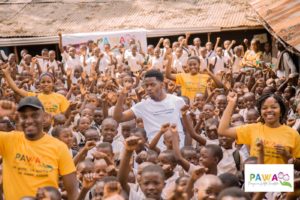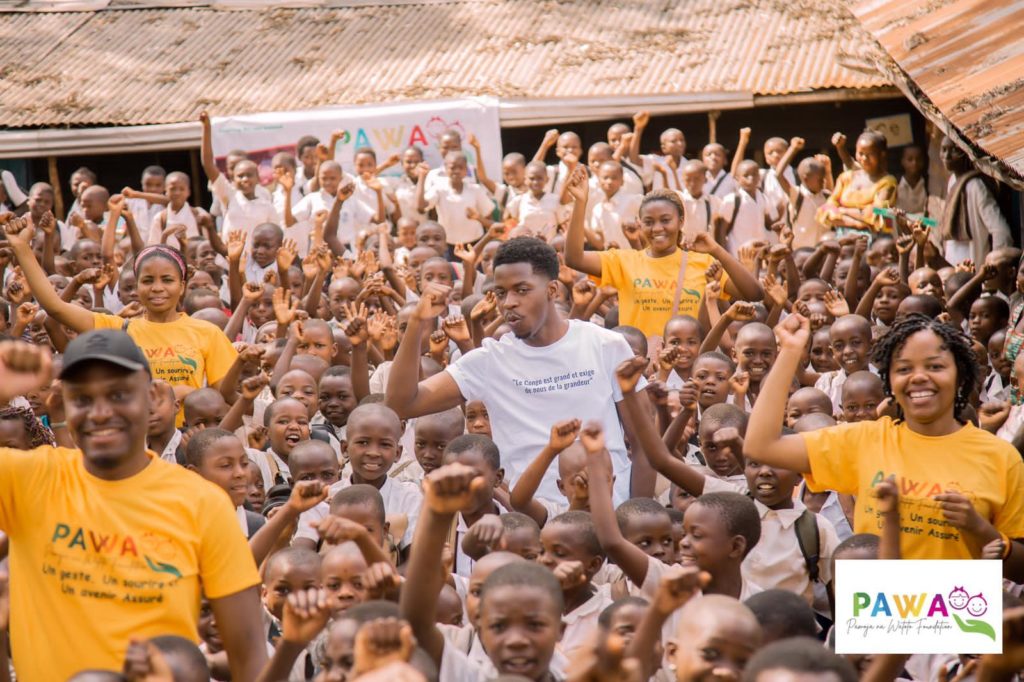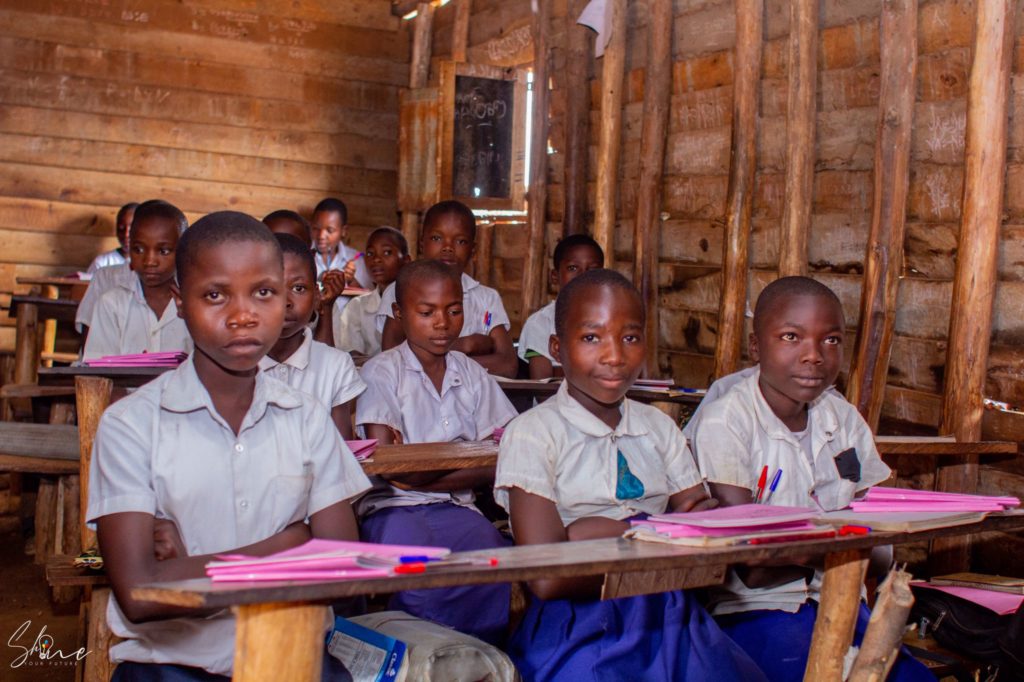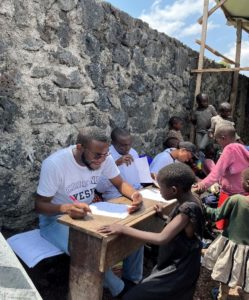

Pamoja na Watoto Foundation (PAWA) is a grassroots organisation working in rural and conflict-affected regions of the eastern Democratic Republic of the Congo. Founded in 2018, Pawa Foundation aims to promote access to high-quality and inclusive education in conflict-affected and remote areas of the Eastern Democratic Republic of the Congo. Pamoja na Watoto is a Swahili phrase that means “together with children”; we believe that together with children we can end the long-lasting conflict and instability that our region has been subjected to for more than 2 decades.
Every child in every community has the right to education however education is an unachievable dream for more than one million children in the Democratic Republic of the Congo (DRC), a country that has been affected by many armed conflicts. According to USAID, 3.5 million children in the Democratic Republic of the Congo of primary school age are not in school, and of those who do attend, 44% start school late, after the age of six.
How do we expect children to take up their position as future or current leaders if they are not equipped to play a transformational role in their immediate community? How can we talk about child abuse or child right if the ones that are subjected to it or beneficiaries are not even aware of its existence? The only way we can successfully involve and equip children is through education. Education implies both formal and informal education. There is no climate consciousness without education. There is no peace without education, and neither will there be development without education.
Considering the above, Pawa Foundation being a youth-led organisation decided to focus on education to bring change and transformation. We have designed programs focusing on transforming education in rural and conflict-affected regions.
- Access to education: We have observed that in many communities access to education is restrained by school fees and parents’ financial situation. Many children end up missing education because their parents cannot afford school fees or where else education might be free of charge, they cannot afford the educational materials or other indirect costs that it implies to keep their child in school. These two situations put children in circumstances where they drop out of school or become irregular in schools or keep attending schools but with frustration and low self-esteem. All this affects the children’s performance in school and their dedication to pursuing further studies. To respond to this problem, we have designed the PAWA SCHOLARSHIP Program that seeks to empower children in remote areas and conflict-affected regions. This flagship program has 2 components: first, the full scholarship component, our program grants scholarships to children from low-income families, orphans, displaced, and children with academic merits. More than 180 children have been beneficiaries of our scholarships. Our scholarships are given to children from primary and secondary school. The other component is the educational materials part; this focus on equipping each child in school with the right educational material to stay in school. By education materials, we imply exercise books, pens, school bags, uniforms, and shoes, … More than 3700 children have benefited from our education materials. This flagship program has been proven effective in keeping children in schools and reducing the number of out-of-school children in remote areas.

- Foundational learning skills: Education for all, without regard to race, gender, region, or religion, is one of the sustainable development goals that UN member countries have set for 2030. Since educated people are more likely to achieve rapid growth. There is a learning poverty which can be explained by the fact that children under the age of ten are unable to read and comprehend a small text or perform a small paragraph. According to the recent World Bank report (2022), in 2019 education poverty was estimated at 57% in low-income countries. Up to 86% in the Sub-Saharan Africa region. Literacy and numeracy problems in conflict-affected regions. Several children have already missed more than 8 months of school due to the resumption of fighting between the M23 and the Congolese army. Children who have been relocated to Kanyaruchinya camp and elsewhere are denied basic human rights as well as the transformative effects of quality education. Education reduces the psychosocial impact of conflict by providing a sense of routine, stability, structure, and hope for the future. Pamoja na Watoto Foundation has designed a strategy to meet children’s educational needs. Our Education Action for Displaced Children (ACEDEP) (Action pour l’éducation des deplacés) is a pilot programme that aims to improve literacy and numeracy skills among displaced children while also promoting peace education for children through the establishment of learning centres in camps and remote areas. we are currently finishing with the construction of the learning centre in the camps and later this April children will begin learning in the centre. The Pawa Community Learning Circle will be a space that can offer literacy, reading, numeracy and peace classes to children in the Kanyaruchinya camp. Our program aims to Strengthen children’s reading, writing and numeracy skills, and promote life skills, peace education and social cohesion among displaced children in the camps. The children will be split into 3 groups based on their academic proficiency. also did the preliminary evaluation, and parents are involved in the program as well. Currently, we are constructing the education centre and believe that latest 27th April children will start learning from our centre. We have conducted child identification and level assessment to determine their academic readiness.

Construction of our learning centre in the camps

Identification of children and level assessment in the cam
- Zero hunger in school: Hunger significantly impacts children’s academic performance. Many children from low-income families go to school hungry, even though physical, and cognitive development, which supports learning and productivity, necessitates an army of nutrients and micronutrients. If hunger harms children’s school performance by lowering their effort and cognition during school hours, access to meals in schools will improve long-term learning. We have established a program called Cup of Uji to ensure that students in rural areas receive a cup of porridge and bread during their school break. For one year, the program was implemented in some schools in eastern DRC but due to lack of funding, we stopped. We have seen how much children and teachers appreciated the program and how it impacted their school performance. If funding is available, we will relaunch the program.
Future program: Digital for all.
Each Pawa program has been designed; Implemented and funded by young people. Pawa has been making change and building strong and peaceful communities through education for the past 5 years and with tremendous impact on the lives of children and the community. We also believe that there is room for improvement and amelioration. We believe that with the right mentorship, funding, and investment we can achieve more and scale our programs to several regions of the Democratic Republic of the Congo. We are a team of 35 dedicated young people building a world where education is accessible to all, and we believe it’s achievable. Together we can, together with children change is possible.
